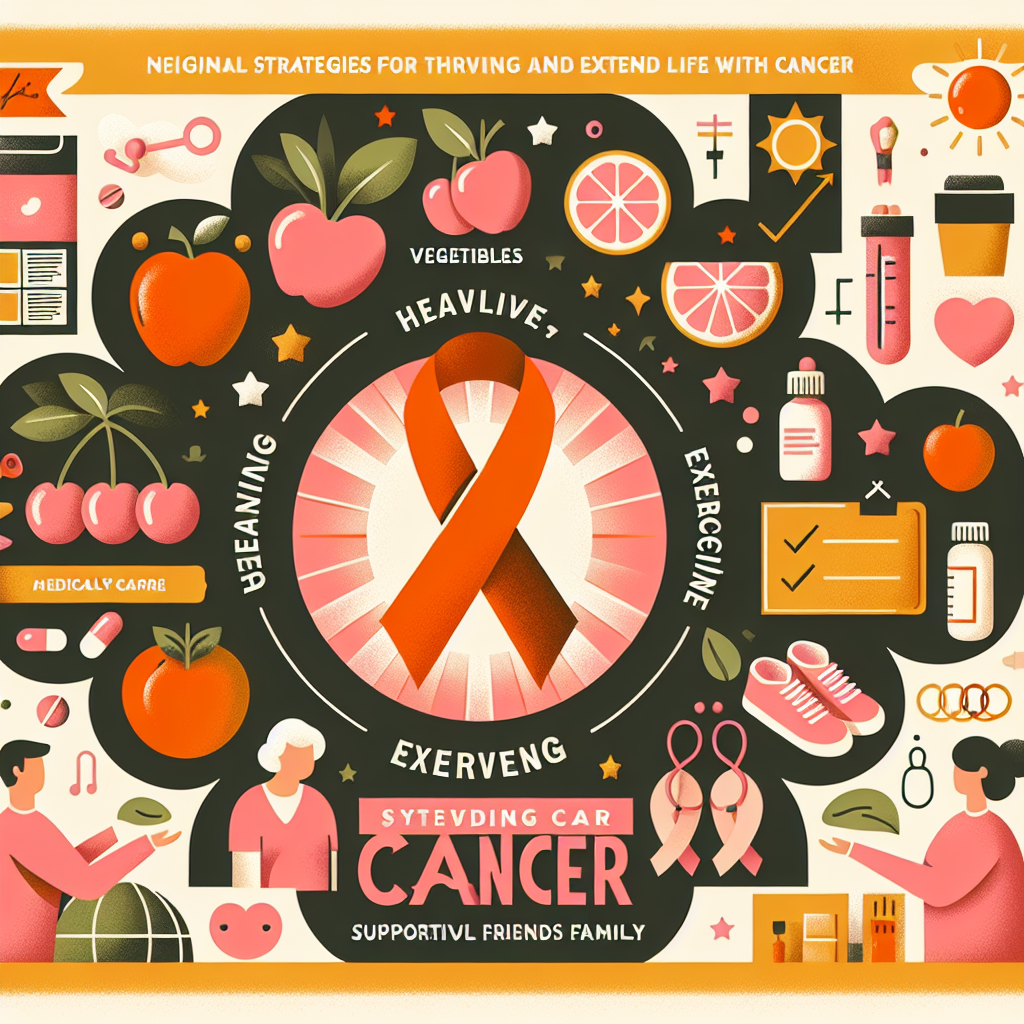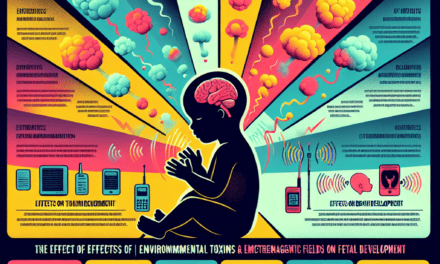Strategies for Thriving and Extending Life with Cancer

Cancer is a formidable adversary, affecting millions of lives worldwide. However, advancements in medical science, coupled with holistic approaches, have paved the way for strategies that not only aim to treat cancer but also enhance the quality of life for those living with it. This article delves into various strategies that can help individuals thrive and potentially extend their lives while battling cancer. By exploring medical treatments, lifestyle changes, psychological support, nutritional interventions, and alternative therapies, we aim to provide a comprehensive guide for patients and caregivers alike.
1. Medical Treatments: The Foundation of Cancer Management
Medical treatments form the cornerstone of cancer management. With continuous advancements in technology and research, the options available to patients have expanded significantly. This section explores the latest in medical treatments, including surgery, chemotherapy, radiation therapy, and emerging therapies such as immunotherapy and targeted therapy.
1.1 Surgery: Precision and Innovation
Surgery remains one of the primary methods for treating cancer, especially when the disease is localized. Advances in surgical techniques have made procedures less invasive and more precise, reducing recovery times and improving outcomes.
Minimally invasive surgeries, such as laparoscopic and robotic-assisted surgeries, have revolutionized cancer treatment. These techniques allow surgeons to operate with greater precision, leading to fewer complications and quicker recovery times. For instance, robotic-assisted prostatectomies have shown promising results in terms of preserving nerve function and reducing hospital stays.
Moreover, the development of intraoperative imaging technologies, such as MRI and CT scans, enables surgeons to visualize tumors in real-time, ensuring complete removal while sparing healthy tissue. This precision is crucial in complex cases, such as brain or liver cancers, where the margin for error is minimal.
1.2 Chemotherapy: Evolving Protocols
Chemotherapy has been a staple in cancer treatment for decades. However, its protocols have evolved to become more personalized and effective. Oncologists now tailor chemotherapy regimens based on genetic profiling of tumors, allowing for targeted treatment that minimizes side effects.
Combination therapies, where chemotherapy is used alongside other treatments like immunotherapy or radiation, have shown improved efficacy. For example, the combination of chemotherapy and immunotherapy has become a standard treatment for certain types of lung cancer, significantly extending survival rates.
Furthermore, advancements in drug delivery systems, such as nanoparticle-based delivery, are enhancing the effectiveness of chemotherapy by targeting cancer cells more precisely and reducing systemic toxicity.
1.3 Radiation Therapy: Precision and Control
Radiation therapy has also seen significant advancements, with techniques like intensity-modulated radiation therapy (IMRT) and stereotactic body radiation therapy (SBRT) offering greater precision in targeting tumors while sparing healthy tissue.
Proton therapy, a newer form of radiation treatment, uses protons instead of X-rays to treat cancer. This method allows for more precise targeting of tumors, reducing damage to surrounding healthy tissues. Proton therapy is particularly beneficial for treating cancers in sensitive areas, such as the brain or spine.
Additionally, adaptive radiation therapy, which adjusts treatment plans based on changes in tumor size and position during the course of treatment, is becoming more common. This approach ensures that radiation is delivered accurately, even as the tumor responds to treatment.
1.4 Immunotherapy: Harnessing the Body’s Defense
Immunotherapy represents a groundbreaking approach to cancer treatment by harnessing the body’s immune system to fight cancer cells. This therapy has shown remarkable success in treating certain types of cancer, such as melanoma and non-small cell lung cancer.
Checkpoint inhibitors, a type of immunotherapy, work by blocking proteins that prevent the immune system from attacking cancer cells. Drugs like pembrolizumab and nivolumab have become standard treatments for several cancers, offering hope to patients with advanced disease.
Moreover, CAR T-cell therapy, which involves modifying a patient’s T-cells to better recognize and attack cancer cells, has shown promising results in treating certain blood cancers. This personalized approach is paving the way for more effective treatments with fewer side effects.
1.5 Targeted Therapy: Precision Medicine
Targeted therapy involves drugs that specifically target cancer cell molecules involved in growth and survival. Unlike traditional chemotherapy, which affects both cancerous and healthy cells, targeted therapy aims to minimize damage to normal cells.
For example, drugs like imatinib have revolutionized the treatment of chronic myeloid leukemia by specifically targeting the BCR-ABL protein, a hallmark of the disease. Similarly, HER2-targeted therapies, such as trastuzumab, have significantly improved outcomes for patients with HER2-positive breast cancer.
As research continues, more targeted therapies are being developed, offering hope for personalized treatment plans that maximize efficacy while minimizing side effects.
2. Lifestyle Changes: Empowering Patients
While medical treatments are crucial, lifestyle changes play a significant role in managing cancer and improving overall well-being. This section explores how exercise, diet, stress management, and sleep can empower patients to take control of their health and enhance their quality of life.
2.1 Exercise: Building Strength and Resilience
Regular physical activity is beneficial for cancer patients, helping to improve physical function, reduce fatigue, and enhance mental well-being. Exercise can also mitigate some of the side effects of cancer treatments, such as chemotherapy-induced fatigue and muscle weakness.
Studies have shown that moderate exercise, such as walking or swimming, can improve survival rates for certain cancers, including breast and colon cancer. Exercise is believed to reduce inflammation, improve immune function, and regulate hormones, all of which contribute to better outcomes.
Moreover, exercise programs tailored to individual needs and abilities can help patients maintain muscle mass, improve cardiovascular health, and boost mood. Engaging in group exercise classes or activities can also provide social support, reducing feelings of isolation and depression.
2.2 Nutrition: Fueling the Body
A balanced diet is essential for cancer patients, providing the necessary nutrients to support the body’s healing processes and maintain energy levels. Proper nutrition can also help manage treatment side effects, such as nausea and loss of appetite.
Emphasizing a diet rich in fruits, vegetables, whole grains, and lean proteins can provide antioxidants and phytochemicals that support immune function and reduce inflammation. Omega-3 fatty acids, found in fish and flaxseeds, have been shown to have anti-inflammatory properties and may benefit cancer patients.
Additionally, maintaining a healthy weight is important, as obesity is a risk factor for several types of cancer. Working with a registered dietitian can help patients develop personalized nutrition plans that meet their specific needs and preferences.
2.3 Stress Management: Cultivating Calm
Stress can have a significant impact on cancer patients, affecting both physical and mental health. Chronic stress can weaken the immune system, increase inflammation, and exacerbate treatment side effects.
Incorporating stress management techniques, such as mindfulness meditation, yoga, and deep breathing exercises, can help patients cope with the emotional challenges of cancer. These practices promote relaxation, reduce anxiety, and improve overall well-being.
Furthermore, engaging in hobbies and activities that bring joy and fulfillment can provide a sense of purpose and distraction from the stresses of treatment. Support groups and counseling can also offer valuable emotional support and coping strategies.
2.4 Sleep: Restoring Vitality
Quality sleep is essential for cancer patients, as it supports the body’s healing processes and helps manage fatigue. However, cancer treatments and stress can disrupt sleep patterns, leading to insomnia and poor sleep quality.
Establishing a regular sleep routine, creating a comfortable sleep environment, and practicing relaxation techniques before bed can improve sleep quality. Avoiding caffeine and electronic devices in the evening can also promote better sleep.
In some cases, cognitive-behavioral therapy for insomnia (CBT-I) may be beneficial, helping patients address sleep-related thoughts and behaviors that contribute to insomnia. Adequate sleep can enhance mood, cognitive function, and overall quality of life.
2.5 Social Connections: Building a Support Network
Maintaining strong social connections is vital for cancer patients, providing emotional support and reducing feelings of isolation. Family, friends, and support groups can offer encouragement, practical assistance, and a sense of community.
Participating in support groups, either in-person or online, allows patients to connect with others who understand their experiences. Sharing stories, advice, and coping strategies can foster a sense of belonging and empowerment.
Additionally, involving loved ones in the treatment journey can strengthen relationships and provide a valuable support system. Open communication and expressing needs and concerns can enhance understanding and collaboration.
3. Psychological Support: Nurturing the Mind
The psychological impact of a cancer diagnosis can be profound, affecting mental health and overall well-being. This section explores the importance of psychological support, including counseling, therapy, and mindfulness practices, in helping patients navigate the emotional challenges of cancer.
3.1 Counseling: A Safe Space for Expression
Counseling provides a safe and supportive environment for cancer patients to express their thoughts and emotions. Professional counselors can help patients process their feelings, develop coping strategies, and address any mental health concerns.
Individual counseling sessions can be tailored to meet the specific needs of each patient, addressing issues such as anxiety, depression, and fear of recurrence. Cognitive-behavioral therapy (CBT) is particularly effective in helping patients reframe negative thoughts and develop healthier coping mechanisms.
Family counseling can also be beneficial, helping patients and their loved ones navigate the challenges of cancer together. Open communication and mutual support can strengthen relationships and enhance emotional resilience.
3.2 Support Groups: Shared Experiences
Support groups offer a unique opportunity for cancer patients to connect with others who are facing similar challenges. Sharing experiences, advice, and encouragement can foster a sense of community and reduce feelings of isolation.
Support groups can be found in various settings, including hospitals, community centers, and online platforms. Some groups focus on specific types of cancer or demographics, allowing patients to connect with others who share similar experiences.
Participating in support groups can provide valuable insights, practical tips, and emotional support. Hearing success stories and learning from others’ experiences can inspire hope and motivation.
3.3 Mindfulness Practices: Cultivating Presence
Mindfulness practices, such as meditation and yoga, can help cancer patients cultivate a sense of presence and calm. These practices promote relaxation, reduce stress, and enhance overall well-being.
Mindfulness meditation involves focusing on the present moment without judgment, allowing patients to observe their thoughts and emotions without becoming overwhelmed. Regular practice can improve emotional regulation, reduce anxiety, and enhance quality of life.
Yoga combines physical movement with breath awareness and mindfulness, offering both physical and mental benefits. Gentle yoga practices can improve flexibility, strength, and balance while promoting relaxation and stress reduction.
3.4 Art and Music Therapy: Creative Expression
Art and music therapy provide creative outlets for cancer patients to express their emotions and experiences. These therapies can be particularly beneficial for individuals who find it challenging to articulate their feelings verbally.
Art therapy involves using various art forms, such as painting, drawing, or sculpture, to explore emotions and promote healing. Creating art can be a cathartic experience, allowing patients to process complex emotions and gain new insights.
Music therapy involves listening to or creating music to enhance emotional well-being. Music can evoke powerful emotions and memories, providing comfort and solace during difficult times. Engaging in music therapy can reduce anxiety, improve mood, and foster a sense of connection.
3.5 Resilience Training: Building Inner Strength
Resilience training focuses on developing the skills and mindset needed to navigate the challenges of cancer with strength and adaptability. Building resilience can enhance emotional well-being and improve overall quality of life.
Resilience training programs often include techniques such as goal setting, problem-solving, and positive thinking. These skills empower patients to face adversity with confidence and maintain a sense of control over their lives.
Practicing gratitude and focusing on positive aspects of life can also enhance resilience. Keeping a gratitude journal or engaging in daily gratitude exercises can shift focus from challenges to strengths and opportunities.
4. Nutritional Interventions: Supporting Healing
Nutrition plays a crucial role in supporting the body’s healing processes and managing the side effects of cancer treatment. This section explores the importance of a balanced diet, the role of specific nutrients, and the benefits of working with a registered dietitian.
4.1 Balanced Diet: A Foundation for Health
A balanced diet provides the essential nutrients needed to support the body’s healing processes and maintain energy levels. Emphasizing whole foods, such as fruits, vegetables, whole grains, and lean proteins, can provide antioxidants and phytochemicals that support immune function and reduce inflammation.
Fruits and vegetables are rich in vitamins, minerals, and antioxidants that help protect cells from damage and support overall health. Incorporating a variety of colorful produce can ensure a wide range of nutrients and health benefits.
Whole grains, such as brown rice, quinoa, and oats, provide fiber and essential nutrients that support digestive health and regulate blood sugar levels. Lean proteins, such as chicken, fish, and legumes, provide the building blocks needed for tissue repair and immune function.
4.2 Specific Nutrients: Targeted Support
Certain nutrients play a specific role in supporting the body’s healing processes and managing treatment side effects. Omega-3 fatty acids, found in fish and flaxseeds, have anti-inflammatory properties and may benefit cancer patients.
Vitamin D is essential for bone health and immune function. Adequate levels of vitamin D can be maintained through sun exposure, fortified foods, and supplements if needed. Vitamin D deficiency is common in cancer patients, so monitoring levels and ensuring adequate intake is important.
Probiotics, found in fermented foods like yogurt and sauerkraut, support gut health and may help manage treatment-related digestive issues. A healthy gut microbiome is essential for overall health and immune function.
4.3 Managing Treatment Side Effects: Nutritional Strategies
Cancer treatments can cause a range of side effects that affect appetite and nutrition. Nausea, loss of appetite, and taste changes are common challenges that can impact dietary intake.
Working with a registered dietitian can help patients develop personalized nutrition plans that address specific side effects and ensure adequate nutrient intake. Strategies may include eating small, frequent meals, choosing nutrient-dense foods, and experimenting with different flavors and textures.
Hydration is also important, as treatments can lead to dehydration. Drinking plenty of fluids and consuming hydrating foods, such as soups and smoothies, can help maintain hydration levels.
4.4 Supplements: Complementary Support
While a balanced diet is the foundation of good nutrition, some patients may benefit from supplements to address specific nutrient deficiencies or support overall health. However, it’s important to approach supplements with caution and consult with a healthcare professional before starting any new regimen.
Common supplements for cancer patients include vitamin D, omega-3 fatty acids, and probiotics. These supplements can support bone health, reduce inflammation, and promote gut health, respectively.
Herbal supplements, such as turmeric and green tea extract, are also popular for their potential anti-inflammatory and antioxidant properties. However, interactions with cancer treatments should be carefully considered, and professional guidance is essential.
4.5 Working with a Registered Dietitian: Personalized Guidance
A registered dietitian can provide valuable guidance and support for cancer patients, helping them navigate the complexities of nutrition during treatment. Dietitians can assess individual needs, develop personalized nutrition plans, and provide practical tips for managing side effects.
Working with a dietitian can also help patients set realistic goals and track progress, ensuring that nutritional needs are met throughout the treatment journey. Regular follow-up appointments can provide ongoing support and adjustments as needed.
Overall, a registered dietitian can be a valuable member of the healthcare team, providing expertise and support to enhance the patient’s quality of life and overall well-being.
5. Alternative Therapies: Complementary Approaches
Alternative therapies can complement conventional cancer treatments, offering additional support for physical and emotional well-being. This section explores various alternative therapies, including acupuncture, massage therapy, herbal medicine, and mind-body practices.
5.1 Acupuncture: Balancing Energy
Acupuncture is an ancient Chinese practice that involves inserting thin needles into specific points on the body to balance energy flow and promote healing. It is commonly used to manage pain, nausea, and other side effects of cancer treatment.
Research has shown that acupuncture can be effective in reducing chemotherapy-induced nausea and vomiting, as well as managing cancer-related pain. It may also help alleviate fatigue and improve overall quality of life.
Acupuncture is generally considered safe when performed by a trained practitioner. It can be used alongside conventional treatments to provide additional support and enhance well-being.
5.2 Massage Therapy: Relaxation and Relief
Massage therapy involves manipulating soft tissues to promote relaxation, reduce stress, and alleviate pain. It can be particularly beneficial for cancer patients experiencing muscle tension, anxiety, and fatigue.
Studies have shown that massage therapy can reduce pain and improve mood in cancer patients. It may also help manage treatment-related side effects, such as lymphedema and neuropathy.
Massage therapy can be tailored to individual needs and preferences, with techniques ranging from gentle touch to deep tissue massage. It is important to work with a therapist experienced in working with cancer patients to ensure safety and effectiveness.
5.3 Herbal Medicine: Natural Support
Herbal medicine involves using plant-based remedies to support health and well-being. Some cancer patients turn to herbal medicine to manage symptoms and enhance overall health.
Common herbs used in cancer care include ginger for nausea, turmeric for inflammation, and milk thistle for liver support. However, it’s important to approach herbal medicine with caution, as some herbs can interact with cancer treatments or have side effects.
Consulting with a healthcare professional or herbalist experienced in cancer care is essential before starting any herbal regimen. They can provide guidance on safe and effective use of herbs in conjunction with conventional treatments.
5.4 Mind-Body Practices: Integrating Mind and Body
Mind-body practices, such as tai chi, qigong, and guided imagery, focus on integrating the mind and body to promote relaxation and healing. These practices can help cancer patients manage stress, improve mood, and enhance overall well-being.
Tai chi and qigong involve gentle movements, breath awareness, and meditation, promoting balance, flexibility, and relaxation. These practices have been shown to reduce stress, improve sleep quality, and enhance quality of life in cancer patients.
Guided imagery involves using visualization techniques to promote relaxation and healing. It can be used to reduce anxiety, manage pain, and enhance overall well-being. Guided imagery sessions can be done individually or in group settings.
5.5 Aromatherapy: Scented Serenity
Aromatherapy involves using essential oils to promote relaxation and well-being. It can be used to manage stress, anxiety, and treatment-related side effects, such as nausea and fatigue.
Common essential oils used in aromatherapy include lavender for relaxation, peppermint for nausea, and eucalyptus for respiratory support. Essential oils can be used in diffusers, added to baths, or applied topically with carrier oils.
Aromatherapy is generally considered safe when used appropriately. However, it’s important to use high-quality essential oils and consult with a healthcare professional if there are any concerns or sensitivities.
Conclusion: A Holistic Approach to Cancer Care
Thriving and extending life with cancer requires a comprehensive approach that integrates medical treatments, lifestyle changes, psychological support, nutritional interventions, and alternative therapies. By empowering patients with knowledge and resources, we can enhance their quality of life and support their journey toward healing.
Medical treatments provide the foundation for cancer management, offering targeted and effective options for treating the disease. Lifestyle changes empower patients to take control of their health, while psychological support nurtures the mind and emotional well-being.
Nutritional interventions provide essential support for the body’s healing processes, while alternative therapies offer complementary approaches to enhance overall well-being. By embracing a holistic approach to cancer care, patients can navigate the challenges of cancer with strength, resilience, and hope.
Ultimately, the journey with cancer is unique for each individual. By exploring a range of strategies and finding what works best for them, patients can thrive and live life to the fullest, even in the face of adversity.




